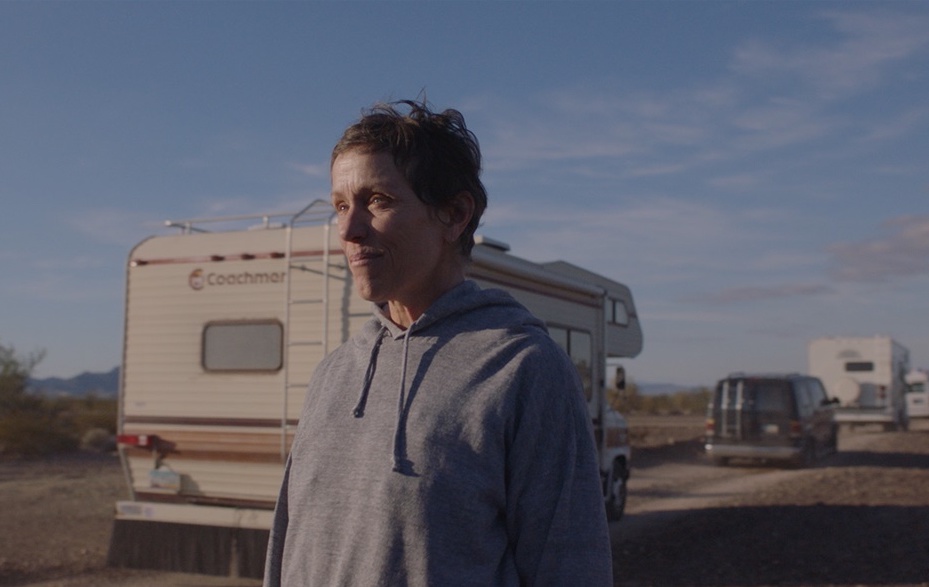Are they really modern bedouins, fighters fleeing the restrictions of ownership or are they just victims of an anti-social system?

Nomadland, who won Oscars this week for Best Film, Best Director (Chloe Chow) and Best Actress (Frances McDormand), offers a special experience, in part because you have the idea of watching a documentary all the time. This is also true to some extent because many of the roles in the movie are played by people who play themselves in one form or another. Drifters, nomads, hikers, whatever you want to call it, people who live in a mobile home or less and who constantly move around the country in search of work, freedom, and fulfillment of life. Outside of the movie, some guys really live this way. They talk about it as if it was liberation, but this life turns out to be difficult and difficult in practice.
The film begins with a village built around a factory where every inhabitant works. When the factory shut down, the village also disappeared. Within a few months, even the zip code was no longer there. We see a former inhabitant. She lives in a truck that she has turned into a cart and works as a casual laborer at an Amazon distribution center. Packing the boxes. When Christmas is over and with it the rush to buy, it becomes redundant and takes the cart to the next job, if at least you can find it. This feeling of insecurity permeates the film. All the time you have no idea what the next step will be like, and what will happen. It feels almost as stressful as it actually is and I mean that as a compliment to the movies.
While watching, I also remembered Sorry, We Missed You Ken Loach, about the lives of self-employed people who work as buyers and in healthcare. They have hardly any money, hardly any future and a lot of worries. This existence has been referred to as “freedom.” The difference is that the British film presents a clear indictment and reveals a perversion of the system while Nomadland scores more and conveys the illusion that living this way is also an option. The protagonist is given the opportunity to escape her existence but she does not. The alternative, stability, looks worse. She is reclusive and proud. During a group outing at a natural monument, she isolated herself from the guide and others. She gets lost instantly and seems to go wrong for a moment, but that doesn’t seem to bother her anyway. Perhaps because she mourns the loss of her husband and dreams of a life. In this sense, too, she holds onto the delusion, just like her struggling buddies. Nostalgia yearns for a future made up of the past.
At the start of this century I toured the western United States and was stunned by the pervasive poverty that you could barely see through the movies and the media. It also surprised me how this is considered normal in the United States. He who does not participate in the constant pursuit of wealth and possessions is not one of them. At the same time, people are very kind to each other and the willingness to help each other is tremendous. The film shows that warmth well, but it does not hide the fact that social ties are also very weak, or as we say in Europe: superficial. This results in a difficult life as everyone ultimately has to be hard on each other. They are individuals who live together without becoming a community. The other is mainly tested as a burden. It is assumed that they value their freedom, but in practice they seem to prevent them from entering into alliances with each other. They are trapped in their sense of freedom. Somewhere in the movie, they compare themselves to the pioneers, the actors of the Great American Illusion. The realization that the pioneers were Land Rover vehicles that wiped out the natives has yet to permeate goodwill. It’s almost as if you can hear Balkenende speak proudly about VOC, without even realizing what he’s saying.
McDormand is acting so aggressively that you have no doubts that she is wandering around and making it possible to recognize her as a viewer, even if that’s the last thing her character wants. As a result, you are immersed in a world that you will never want to be in, but which always makes you feel curious. Are they really modern bedouins, fighters fleeing the restrictions of ownership or are they just victims of an anti-social system? The story based on a non-fiction book leaves the answer for you.
Nomadland is one of those movies that I don’t know if I’m going to forget soon or I’ll be around for the rest of my life. This suspicion usually refers to the latter.
No video? click here.

Evil tv scholar. Proud twitter aficionado. Travel ninja. Hipster-friendly zombie fanatic.

